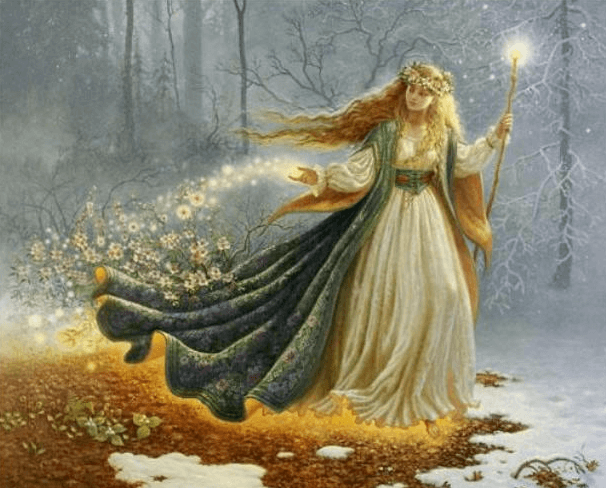The topic of love is very sacred to Norse mythology. Love is often associated with jealousy and if so, ends in a tragedy. There have been lots of tales in which an old king’s wife falls in love with a young admirer.
In the Irish tale, Deirdre was destined to marry the King of Ulster Conchobar, but she fell in love with Naiose and persuaded him to flee away with her. They were forced to return back home by deception, and Naiose was killed. In desperation, Deirdre took her own life shortly after the wedding with Conchobar.
Among the most famous stories of love triangles are Tristan and Isolde, the story of Sigurd and Brynhild, but perhaps the most popular one is the story of Arthur, Guinevere, and Lancelot.
The latter is especially important to the meaning of love in the Scandinavian culture. It follows many other stories in that a queen falls in love with a knight, and while they try their best at keeping their love as a secret, they aren’t able to do so for long. 12 knights caught them in the same bed, and there was no going back from that. They were both punished for their love.
If you want to find out more about this fascinating story about love and pain, then be sure to order this book by Carol Anne Douglas called Lancelot and Guinevere, a sequel to Lancelot: Her Story. It depicts the entire story from the point of view of Guinevere and is about how she faced the wrath of King Arthur when he found about her relationship with Lancelot.
You cannot talk about love in the context of Norse mythology and not mention Freyja.
Freyja, according to Scandinavian sources, is referred to as the member of Vanir and is considered to be the daughter of Njörðr and the goddess Nerthus, as well as being Freyr’s sister.
Freyja is the wife of Odin, the god of sunlight. When Odin goes on a long journey, Freyja mourns him with golden tears pouring down her tears, and she goes traveling unknown countries in her search for him. She is the mother of the daughters of Hnoss (“precious stone”) and Gersemi (“treasure”).
All over the world, there is no god that would be equal to her in beauty – neither among people nor among gods. At the same time, her heart is so soft, so overwhelmed with tenderness that she sympathizes with the suffering of everyone. But at the same time, Freyja is a formidable warrior, the leader of the Valkyries, who pick up and carry away the fallen warriors to Valhalla.
Freyоa herself, in fact, performs the functions of Valkyries – she divides and selects the killed warriors with Odin every day. The ancient Germans devoted Freyja one day of the week, that being Friday (Freitag). It was considered to be a happy day. Since Freyja was the goddess of love, Friday was the most auspicious day for making peace, for all matters of love, and marriage.
Freyja symbolizes the tender of feelings, that being love, care, affect, passion, and a deeper sense of connection to another person. If it happens that you are missing these things in your life, then we have a dating site just for you. You can meet lots of hot stunning brides online without leaving the comfort of your home. Be sure to give it a try.
Later, under the influence of Roman mythology, this day was associated with Venus, and the love-erotic aspect was added to the symbolism of Friday and to Freyja herself. In other sources, it is indicated that the day of Freyja is actually Monday! According to legends, Freyja controlled the weather and clouds. Her duties also include the growth and maturation of crops – above all, flax. It was believed that she could control water, as well as water creatures. It is possible that Tacitus implies Freyja when he mentions Isis worshiping by the Germans, but there is no hard evidence and little to no information about the existence of the goddess cult in the culture of Western Germans. With the affirmation of Christianity, the virgin and maternal traits of the goddess passed away; on the one hand, to Mary and, on the other, to witches. In neo-paganism, Freyja is worshiped in the pantheon of the Scandinavian and Germanic gods.
She is a vivid expression of feminism, combining sexuality, fertility, aggression, and courage.




























